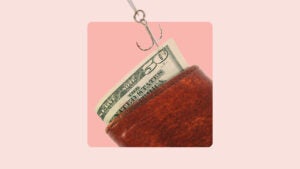What happens if you don’t pay an unsecured business loan?

Key takeaways
- Defaulting on an unsecured loan can impact your business and personal finances
- When you default on an unsecured loan, the entire loan becomes due immediately
- Your lender may be able to help you find a solution and avoid default
For many entrepreneurs, unforeseen circumstances often lead to missed payments or defaulting on the loan entirely. According to the 2024 Small Business Credit Survey, 35 percent of small businesses had difficulties repaying their debts. Additionally, 27 percent of businesses surveyed applied for funding to either pay off or refinance their existing debts.
When this happens with a secured loan backed by collateral, the lender can take the collateral as payment. However, with unsecured loans, there is no collateral backing the loan, so not repaying an unsecured loan can be far more damaging to both your business and personal finances.
Here is what happens if you default on an unsecured business loan and steps to take if you’re struggling with unsecured loan payments.
What happens if you miss business loan payments?
Missing payments on a business loan is never a good idea. The initial consequence is accruing late fees, making your financial situation more challenging. Plus, the loan becomes delinquent once you fail to pay on the loan’s due date.
If you continue to miss payments, expect to hear from the lender’s collections department. Leslie Tayne, Esq., founder of Tayne Law Group, a New York-based debt relief law firm, notes that after a month or two, you’ll begin to receive calls and letters “in an effort to get the account back in good standing.”
What happens if you default on an unsecured business loan?
After multiple months of not making loan payments, the loan status will typically shift from being delinquent to being in default.
“This means you’ve failed to repay the loan according to the contract terms,” says Tayne, “at which point the lender will start taking more aggressive steps to collect the debt.”
Knowing what happens if you don’t pay a loan back can help you take action before it becomes a larger issue. Here are a few things that can happen:
- Your entire loan balance becomes due.
- Your lender can seize your personal assets.
- Your credit score can go down.
Your entire loan becomes due
When a loan is in default, it may trigger what’s known as an acceleration clause in your loan contract.
“If a loan or note has an acceleration clause provision, then the entire loan balance becomes due immediately if the borrower fails to uphold certain requirements, such as making timely payments,” says Tayne.
Plus, if the lender sends the debt to a collection agency, you may also be hit with collection fees. And worse yet, the lender can also initiate legal action against your company at this juncture, suing you for unpaid debts, which will cause you to incur court costs and potentially attorney’s fees as well.
Your personal assets could be seized
Unsecured loans are not backed by an asset or collateral, but that doesn’t mean a lender is without recourse. Often, when providing this type of financing, lenders require borrowers to sign a personal guarantee. This type of legal promise allows lenders to offset their risk and means you’re personally liable if your business defaults on the debt.
“Under certain circumstances, a business owner’s personal assets are protected from any financial issues related to the business. That’s not the case with a personal guarantee, however,” says Tayne. “This guarantee agreement allows the lender to go after a borrower’s personal assets if the company can’t satisfy the debt, including bank accounts, real estate and vehicles.”
Many traditional and online lenders and SBA loans require personal guarantees for unsecured loans. These lenders will expect you to use your personal funds to maintain a business loan if need be. And if you can’t, the lenders may initiate legal proceedings.
Your credit score and report will be impacted
Defaulting on a business loan is not just bad for your immediate finances. Your business credit score and, potentially, your personal score will take a hit.
Once a loan is over 30 days past due, the lender may report the delinquency to credit bureaus. When that happens, Tayne notes that it will be more difficult to obtain loans and lines of credit in the future since “missed loan payments and defaults stay on your credit reports for seven years.
What to do if you can’t pay an unsecured business loan
If your business is facing financial hardship, making it difficult to repay a loan as agreed, it’s important to be proactive and try to find a resolution that helps avoid severe consequences.
Consider taking one or more of the following actions:
- Discuss your options with your lender
- Consider a debt consolidation loan
- Change your loan terms
Talk to your lender
When you can’t afford to make business loan payments, it’s important to reach out to the lender as soon as you think there’s a problem. The best unsecured business loans come from lenders willing to offer some assistance. This may include restructuring your loan, offering deferment or forbearance or refinancing the debt.
But ignoring the problem and letting your loan payments slide and become delinquent will only result in harsher consequences that will be more difficult to reverse or resolve.
Take out a debt consolidation loan
Taking out a debt consolidation loan is another option that can help you recover. Like small business loan refinancing, you are taking out a new loan, but since consolidation involves replacing existing loans with a single new loan, it may be the better option if you have multiple business loans. Ideally, through debt consolidation, you can obtain lower monthly payments or shorten your repayment timeline, or in some cases, both.
You typically need good credit to obtain the lowest, most favorable interest rates on a consolidation loan. You’ll also need to have a plan in place to help you manage your loan. As Tayne notes, “If you don’t address the underlying issue causing you to fall behind on loan payments, taking on a new loan that you can’t afford to repay won’t help your situation in the end.”
Restructure your debt
When you restructure your debt, you change the terms of your loan. This means you may be able to extend the payment period, which will lower your monthly payments. Or you may be able to negotiate a lower interest rate. This is a good option when you’re behind on payments, and it’s clear that there is no way you’ll be able to catch up and repay the past due balance and continue making payments.
Pros and cons of filing for bankruptcy
Filing for bankruptcy should be your last resort, as this step has serious consequences, including being costly, time-consuming and impacting your credit for years to come; however, if other debt solutions aren’t working for you, there are some positive outcomes to filing for bankruptcy.
Pros
- You may be able to hold onto valuable assets. Filing for bankruptcy can prevent certain large assets — like a vehicle or your home — from being seized and liquidated by lenders. A Chapter 13 bankruptcy, for example, requires foreclosure proceedings to halt, and a payment plan is created to pay your mortgage.
- You will likely pay less than you owe. Depending on what type of bankruptcy you file, all of your unsecured debt may be wiped out. Even in cases where you’re required to pay, it may only be a portion of what you actually owe.
- You’ll be granted an automatic stay. Once you’ve filed for bankruptcy, debtors are required to stop harassing you with phone calls and letters, and threatening you with lawsuits, which can offer some relief.
Cons
- There are additional costs associated with filing for bankruptcy. It can cost over $300 just to file for bankruptcy, and estimated attorney fees can cost up to $6,000, depending on the type of bankruptcy you file, where you live and how complicated your case is.
- Your credit will be impacted. In addition to the impact on your credit from any delinquencies or defaults that may have led to your bankruptcy, a record of a bankruptcy can take your score down by up to 200 points. This can impact your ability to rent or purchase a home, finance a vehicle and can even negatively affect your career. A bankruptcy will stay on your credit report between seven and 10 years, depending on the type you file.
Bottom line
Understanding what happens if you can’t pay back a business loan is crucial to protecting your financial future. If you run into unexpected challenges and fall behind on an unsecured loan, ignoring the issue can lead to serious consequences, like having to pay the full loan amount, damaged credit or even asset seizure in some cases. But you can avoid these outcomes by pursuing some options, including contacting your lender to discuss your situation, seeking debt settlement or applying for a debt consolidation loan.
Frequently asked questions
-
If you can’t repay an unsecured business loan, it can lead to serious consequences, such as the seizure of assets if you signed a personal guarantee. But, there are a few things you should try before defaulting. If you can’t repay your loan, talk to your lender, consider a debt consolidation loan or restructure your debt.
-
If your business loan goes into default, the balance becomes due immediately. The lender may also take legal action, and your credit score may suffer, affecting future borrowing capability.
-
If you have an unsecured small business loan, you may have signed a personal guarantee. If so, you will be legally and personally liable if you default on the business loan.
Why we ask for feedback Your feedback helps us improve our content and services. It takes less than a minute to complete.
Your responses are anonymous and will only be used for improving our website.
You may also like


What happens when you can’t repay a payday loan?

What happens if you default on a business loan?



